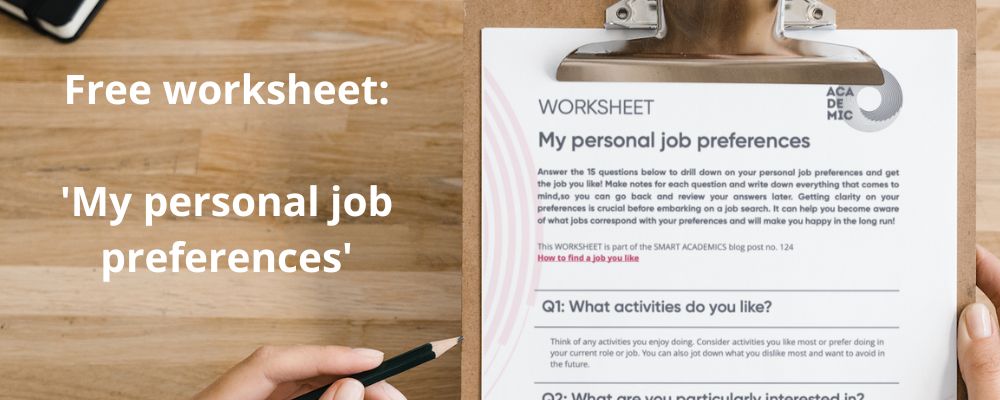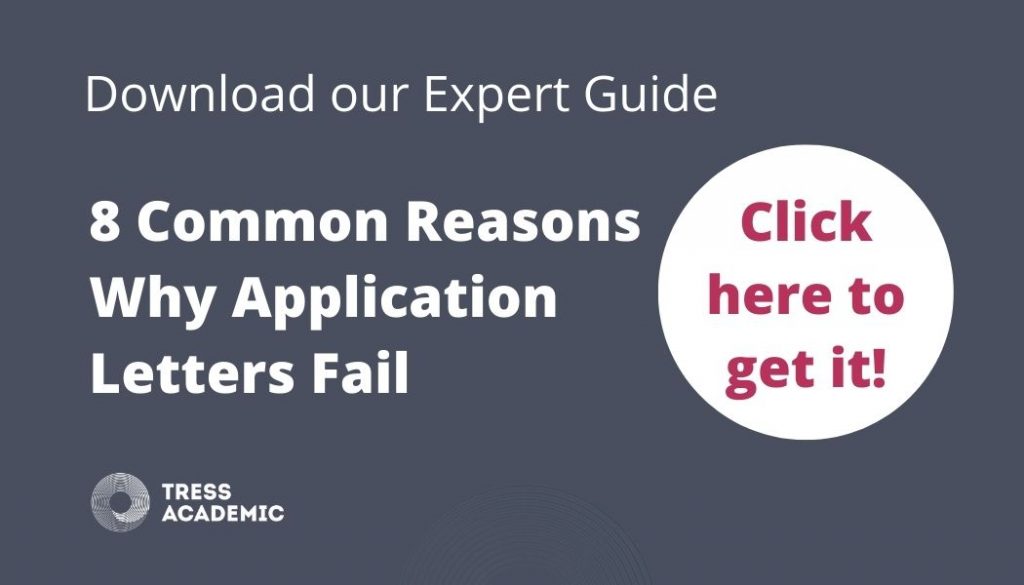Are you near the end of your PhD or a postdoc position? Then thinking about the next career move is a crucial, yet often daunting task. Being in the final phase of one academic career stage and about to enter the next is typically a phase of uncertainty about the future. In this situation, it may be tempting to just take the next step on the academic career ladder or take the job that you think is easiest to get, but think twice! In this blogpost, we reveal why it is highly important to figure out what you like and don’t like in a job and to take that into account when you decide on a career path and start searching for jobs.
Answer these 15 questions to find the job you like!
In our awesome free worksheet, ’My personal job preferences,’ we’ll help you to identify your likes and dislikes. You’ll answer 15 questions, which will ultimately help you to make the right career choices and thrive in your next job.

Afraid of what comes next?
Many scientists experience anxiety about their future because they don’t know what they could or should do next and are afraid of the unknown. It is a somewhat uncomfortable situation that one wants to escape sooner rather than later. Anxiety comes from not knowing what job to look for and not knowing how to get started with the all-important search for a job. There are many individual questions to be answered, and whether to stay in academia or not is just one of them.
In that phase of uncertainty, many academics tend to go for the ‘low-hanging-fruit’–that is they go for the job that involves the least amount of change: Accepting the kind offer from your supervisor for yet another post-doc year, jumping on the possibility to work in a 3rd-party funded project of an existing collaborator, or signing a follow-up contract at the same institute you have been working at. But the ‘lob-hanging-fruit’ approach might just land you in a dead-end sooner rather than later.
Instead: digging a little bit deeper and finding out what you truly want for your next career stage is the better long-term strategy. This often involves answering deeply challenging questions about what you truly want in a career, in your life in general, and what would make you happy in the long run.
Knowing what you truly like in a job and what you dislike is immensely helpful when figuring out what type of job to search for and what type of job will give you pleasure and satisfaction in the long run.
Why you should ponder your preferences before starting to search for a job?
If you avoid looking at your preferences, you risk entering one job after the other while never being fulfilled or happy. This might only come to the surface after you’ve spent years in a career already. You may experience undefined feelings of boredom, stress, and dissatisfaction. The underlying reason is that you don’t find your work activities interesting or you find them energy draining. Working on something that you dislike will always feel more demanding than something you love.
You’ll feel more energetic and success comes easier if you work in a profession that plays to your strengths and that you enjoy. Goleman, Boyatzis and McKee (2002) speak about the ‘ideal self,’ the person you truly want to be, versus the ‘ought self,’ which is what other people might think you should be, or what they expect from you. While it is highly inspiring to think about your preferences and the person you want to become, it is downright restricting and demotivating to merely do what was expected from you in the end or what might be a logical next step regardless of your preferences.
What do we mean by personal preferences?
Personal preferences are, in a very holistic sense, what you like in a job. Preferences include all aspects of a profession. Think of the physical circumstances and main activities or occupations you’ll perform. Think of underlying values as well as financial aspects. Consider your strengths, and what you’ll like doing. It is very important that you consider what motivates you, drives you, and makes you tick.
In our free worksheet ’My personal job preferences,’ we’ll help you identify your likes and dislikes.
We all have things we’re naturally good at and that come easily to us. In relation to that, we often have skills that we’ve honed and trained over the years which reinforce what we’re good at. We like what we’re good at, and that results in us doing or wanting to do more of it, which helps us get even better. Let’s say coding has been your passion ever since you got your first computer at age 12, you took every chance to take coding courses, you were always keen in teaching yourself further skills, and spent endless hours of your teenage years in front of a screen. Then it comes as no surprise that you’re now an expert who has mastered a few coding languages and excels in whatever coding job comes your way.
But preferences can also be much more hidden. Let’s say you’ve got a preference for teaching students, you love standing in front of a bunch of young people and transferring knowledge to them. On the surface, it may seem as if ‘teaching’ is your preference, while your real motivation is that this gives you the chance to perform in front of an audience. So ‘performing’ is your true preference, and there might be many different ways or contexts in which this can be accomplished in a job.

How to make the ‘right’ decision?
What is the ‘right’ decision? Think about this for a moment. The ‘right decision’ is always the one that
- Feels ‘right’ in your personal situation and circumstances
- Is the best choice for you
- Is based on your personal preferences
What is ‘right’ for you might be deadly boring to another person. What makes you happy in a job might drive someone else crazy. Maybe this is a bit of a relief for everyone who is a bit anxious: If you dare to be honest with yourself, there won’t be a ‘wrong’ decision. But knowing what you really want can take time. Figuring it all out ’ is a step-by-step process. The challenge is to be brave enough to admit to yourself what you truly want and go for that (Bronson, 2005).
Are you afraid that you can’t get what you want?
Chances are that you won’t get the perfect job from the get-go. But (and this is a BIG but,) your career is long – you might work for another 30+ years. So finding out what you really want and which career best suits you can take time! And that’s ok! In any circumstance, it is absolutely worthwhile trying, because it is amazing what you can achieve professionally over a couple of years if you have clarity on what you want. Otherwise, you’ll always search in vain.
It might not be a job in the perfect location at first, it might not even be in the region you’d like to live. It might not be the salary you expected or the hours you wanted to work. However, what you do might feel exciting and mostly enjoyable, and that might outweigh the disadvantages. The experience you gain will get you closer to your dream job.
In his book The Career Playbook: Essential Advice for Today’s Aspiring Young Professional, Citrin (2015) presents a triangle of job, compensation, and lifestyle. In a nutshell: It’s virtually impossible to get the perfect match in all three areas right at the outset of your career. But it’s a great strategy to start at the point that is most important to you and then gradually optimise as you move from one job to another.
How can you figure out what your preferences are?
What your preferences are may not be so obvious. You may have unknowingly been seeking out jobs and occupations you liked in the past. So now your task is to make explicit what thus far has been going on subsurface. It can also help to ask people around you what they think you do particularly well, or what they would consider a particular strength or unique ability of yours.
A great way to think about your preferences in a more systematic way is our free worksheet ‘My personal job preferences.’ We’ve carved out 15 questions to help you consider essential aspects when looking for your next job!
If you want to thrive in your future career, start your job search by thinking about what you like and what is important to you, then gradually see how you can come as close to the job you love as possible.

Resources:
- Worksheet My personal job preferences
- Smart Academics Blog #107: 10 tips to kick-start your career preparations now
- Smart Academics Blog #77: When should I start searching for my next job?
- Bronson, P. 2003. What should I do with my life? The true story of people who answered the ultimate question. New York: Ballantine Books. (See SMART ACADEMICS blog #76 for a short summary)
- Citrin, J. M. 2015. The career playbook. Essential advice for today’s aspiring young professional. New York: Crown Publishing.
- Goleman, D. Boyatzis R., McKee, A. 2002. The new leaders. Transforming the art of leadership into the science of results. London: Little Brown.
More Information:
Do you want to successfully complete your PhD? If so, please sign up to receive our free guides.
Photo by Product School on Unsplash.
© 2022 Tress Academic
